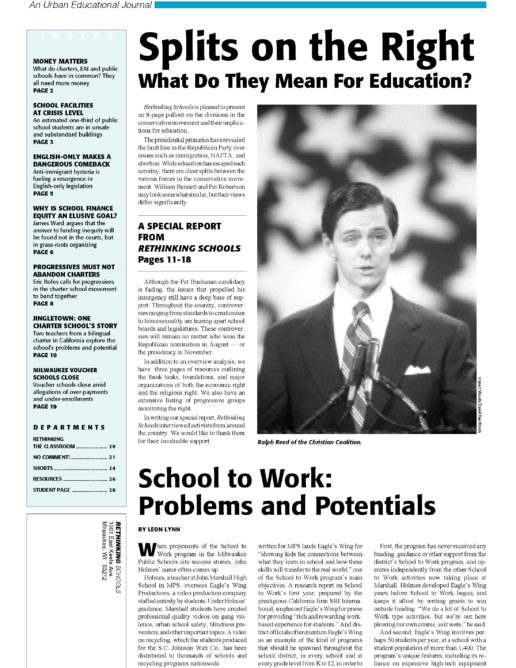The Courage of Our Contradictions
Progressive educators work with charter schools
Between workshops at a statewide charter school conference, a woman pulled me aside in the hallway and backed me into an alcove. “I know who you are,” she whispered. “I’ve read the books you wrote with your open classroom students. What are you doing at a charter school conference?” I explained that I was a graduate student researching charter schools and dispelled her notion that I was a spy for a radical teachers’ organization. She then confessed her progressive credentials: teacher’s union activist, environmentalist, anti-racist organizer. She said she was attending the conference because, after many frustrating years in inner city schools, she was part of a small group of teachers thinking about founding a charter school. Why was she sneaking around, whispering in alcoves? “This conference is dominated by conservatives,” she said. “If they knew what I stood for, I’d be outta here in no time flat.”
As part of my multi-year study of charter schools in five states I have visited over two dozen schools, met with school founders, and observed many classrooms. I have attended public hearings and statewide conferences, interviewed union activists and leadership, and talked with federal policy-makers who fund charter school initiatives.
I am an educator committed to multiculturalism, equity, and public education. I define myself as “progressive,” aligning myself with those who believe there are structural barriers emerging out of late 20th century capitalism which must be uprooted if democratic education is to flourish and all children are to receive quality schooling. My research places me in a strange position with many colleagues and longtime political allies. One friend who has worked in public schools for 20 years, on hearing of my research, assumed my intent was to expose charter schools “as a tactic of the Right” to “destroy public education.” The graduate division in which I am enrolled promotes itself as offering a “radical critique” of education. One of the professors, on hearing I was organizing a roundtable for charter school researchers, warned me away from the field. “Don’t you know that charter schools are just another attempt to re-segregate public education?,” she asked.
It is difficult to discuss charter schools as a single entity because there are vast differences in charter policies and school development in the 20 states which have approved charter legislation. One central feature is the charter — a formal, written contract between school organizers and some sponsoring agency (common examples would be a local school board, state board of education, specially-appointed state chartering committee, or public university) which is expected to capture the school’s spirit and philosophy. School organizers are commonly teachers or parents, but, depending on the state, may also be an existing school, non-profit organization, or for-profit firm. Charter schools are generally funded by the state on a per pupil basis. Essential funds are taken from the student’s school district of origin and transferred to the charter school.
Charter schools are not private schools; they are public schools freed from many local and state regulations in exchange for meeting what are essentially educational productivity levels inscribed in the charter. Some states allow charter schools to hire non-union, non-certified teachers. In two states, private schools may apply for charter school status; in the other 18, charters are given to existing public schools who seek to convert to charter status, or to new schools. Charter schools include primary, middle, and high schools, and several combinations of these levels. In most states, they appear roughly to be split between urban, rural, and suburban.
The first charter school law passed in Minnesota in 1991. Since then, almost 250 charter schools have opened across the country, the majority in California and Arizona. Charter advocates tend to divide state policies into “strong” and “weak,” “real” or “pseudo,” or “live” and “dead” charter school laws.
Charter advocates consider “strong” laws those policies which permit more than one body to issue charters for public schools and allow for a range of groups and individuals to become charter school founders. Charter school theorist Ted Kolderie refers to this process as “states beginning to withdraw the ‘exclusive.’” “Weak” policy states, for example, may allow only local school districts to issue charters and provide no other options (a state charter school committee, for example) for charter founders. Hence in most of these states, charters are rarely granted and, when they are, the schools remain closely tied and dependent on the school district. “Live” policies allow for an unlimited number of charters to be granted, while “dead” policies allow for a small and limited number. “Live” policies provide an automatic exemption from most state regulations with each charter granted and allow local school boards no legal authority over charters granted by other chartering bodies.

SOME HARD QUESTIONS
Why have I chosen charter schools as the focus of my graduate career? Have I abandoned long-held values supporting unionization, multiracial schools, and public education reform? Are my middle-class roots showing, or is my intense interest in charters a sign that I’ve entered middle age and moderated my ideals? Is my interest grounded in a spirit of hope for public education, or is something else going on? Have I approached this new sector with the open mind supposedly striven towards by researchers, or am I bringing along biases in favor of, or in opposition to, charter schools?
As I’ve traveled around the nation, one thing has become clear: I am not the only educator interested or involved in charter schools who defines himself or herself as “progressive.” And I am not the only one grappling with confusion and doubts about my involvement and intentions. We cannot deny that charter schools have been championed in parts of the country by the Right and linked to voucher initiatives, reduced funding for public education, and the hiring of private for-profit firms to manage public schools. The movement has become represented in the educational press as a largely conservative initiative and has occasionally been linked to Christian Right campaigns to dominate schooling.
Yet the actual social, cultural, and political life of charter schools is complex, textured, and resistant to narrow categorization. The “charter school movement” — a nebulous collection of individuals and unaffiliated organizations advocating for charter legislation — is not comprised entirely of conservatives and doesn’t march in lock-step order. Political efforts supporting this reform cross party lines and charters have been supported frequently by legislators in liberal, progressive, or moderate districts. While free-market, neoconservative think tanks have attained impressive visibility in the drive for charter schools, many of the movement’s key educational practitioners, academics, and theorists are distinctly left of center. What seems to unite charter advocates is a desire for greater parental and community control of schools, a resistance to bureaucratization of public education, and the expansion of school choice beyond the affluent.
Regardless of who is pushing the charter agenda from the top, at the grassroots level many of those establishing charter schools support a range of philosophies and pedagogies which many conservatives are likely to oppose: developmental education, mixed-age groupings, child-centered programming, multicultural curricula, and alternative assessments. A recent report from the Education Commission of the States and the Center for School Change suggests that charters may be evenly split between a traditional academic approach (“back to basics” or “college prep”) and more innovative approaches (“integrated curriculum/ inter-disciplinary”). One state official from the South attempting to implement charter schools met stern, organized resistance from the state’s Christian Coalition, who seemed intent on opposing any school reform measure which prioritizes teaching and program innovations over traditional, back-to-basics curricula.

COMING OUT OF THE CHARTER CLOSET
Throughout the nation, progressive educators working on charter schools pull up their collars, lower their voices, and hope they are not noticed. It is not uncommon for me to be two hours into an interview when my subject — having picked up my cues — asks me, “You’re coming from the Left, aren’t you?” When I nod yes and turn off my tape recorder, a barrage of emotions spill out: frustration with having to pretend to be politically moderate, the fear and self-doubt which accompany isolation, guilt about facing down union officials. It sometimes seems as if my subjects are tremendously relieved at finally having found another sympathetic educator who understands both the culture of the Left and the politics of charter schools.
Not all progressives in charter schools find themselves isolated. In fact, even in states where charter legislation was initially an effort of moderates and conservatives, the programs which are emerging include significant numbers of schools constructed around progressive philosophies, curriculum, and methods. The point of charter legislation seems to be to allow folks sharing a common interest—from the Left, the Right, and everywhere else— to cluster in a particular learning environment and recruit like-minded families. Thus, charter schools have been created around specific philosophies and methods (Montessori, Accelerated Schools, or Coalition of Essential Schools), populations (such as high school drop-outs), and underserved communities (Native Americans, hearing-impaired students, or Central American refugees).
Some opponents of charter schools argue that the new sector is anti-democratic because many of the schools do not draw families from a spectrum of political and philosophical views and are counter to the vision of a good common school. Yet many progressive educators insist that charters provide their first opportunities— after years of frustrated attempts within school systems—to imagine, design, and craft educational programs of integrity and vision. Despite the plethora of innovations which have been attempted and successfully implemented within some public school systems, many teachers and parents still want increased autonomy and the power to innovate.
The overwhelming majority of state charter policies make considerable effort to ensure that charter schools cannot select students based on previous academic work, test scores, or interview processes. All charter schools are schools of choice, and most oversubscribed schools are required to select their students through a lottery process. In most states, teachers unions can be credited with forcing policy-makers to craft charter legislation which deters “creaming,” or providing preferential admissions to academically talented students. Despite these efforts, some charter schools may be creating school cultures which discourage poor and working-class families from participating. For example, California charter schools are not required to provide transportation to and from school or offer lunch programs. Some require parents to sign contracts promising a certain number of volunteer work hours in the school each semester. These features might serve as quiet barriers to full participation by all families. The conundrum of these questions is clear in a recent study of California charters by Ronald Corwin and John Flaherty of Southwest Regional Laboratory. The study suggests that “most charter schools serve high concentrations of minorities” yet also may “underserve low-income students.”
ISSUES FOR PROGRESSIVES
As more states pass charter school legislation and the number of schools increases, it may be worthwhile for progressive educators to not only pose serious questions, but to jump on the charter school bandwagon and use the freedom from regulation to create innovative centers of learning for public school children. In some inner cities, charter schools have garnered tremendous neighborhood involvement and may be a source of revitalized community participation in local schools. When such energy emerges from a community-based drive, particularly in communities of color and multiracial working class neighborhoods (as can be witnessed in Detroit, Oakland, Denver, Boston, and St. Paul), analysis is merited, rather than dismissal.
Some charter school advocates clearly do position themselves as progressives. Teachers and students at Jingletown Middle School in Oakland have coalesced around a commitment to Latino families who had long felt underserved in the broader public system. The Berkeley Public Charter School, awarded a charter from the Alameda County Board of Education in December 1995 after a string of rejections from their local school board, is based on a commitment to diversity. And some charter school advocates nationwide, like Joe Nathan, director of the Center for School Change at the Hubert Humphrey Institute of Public Affairs at the University of Minnesota, publicly articulate historical linkages between the “charter school movement” and social change efforts of the past 30 years.
Yet the more common experience of many progressive educators is to become interested in charter legislation, organize with people of vastly differing views, and then find themselves isolated and filled with misgivings, doubts, and contradictions. It might be time for progressive educators working with charter schools to come together, confront these contradictions, and find a collective voice.
A range of questions and accusations are frequently lobbed at teachers, parents, and charter school founders who differ philosophically from conservative educators: Don’t you care about the future of public education? How can you drain finances from already impoverished public school systems? Why are you supporting the creation of a sector which takes the “best” students out of the system? Are you trying to demean the teaching profession by supporting schools which, in some states, may hire uncredentialed teachers and offer little job security?
The liberal response to these questions is generally heartfelt and focuses upon individual children or individual schools. We care about the education of children and charter schools seemingly hold out a promise. We’re doing this because we care about public education and we want to create innovative, quality public education. Our efforts allow all families greater options; why should choice only be available to the affluent?
Progressive educators often can’t answer these questions as easily. We’ve seen too many school reform initiatives come and go, relegated to the junk heap of great ideas that turned out to be little more than fads. These challenges tap into deep and complex issues about which we sincerely care. While Minnesota and California point to a few inner city charter schools serving poor communities of color, at this stage in the movement, there are few examples of charter schools successfully integrating previously segregated communities. Like most public schools, most charters appear to be either overwhelmingly white or overwhelmingly of color. Are charter schools following the typical path of school reform: primarily sparked, spurred, and spearheaded by the middle-class?
Other questions nag at progressive educators in charter schools: If charter schools are schools of choice, will they disproportionately serve families motivated to ask questions, seek alternatives, and make application—activities historically correlated for reasons of time, resources, and educational background, with class status? If the dramatic increase in states approving charter legislation continues—and if most of these states embrace policies that do not require charter school teachers to be certified or a part of the union—what impact will this have on the continued viability of teachers unions and the profession of teaching?
A MODEST PROPOSAL
It is time for progressive charter school advocates to engage in grassroots organizing. It is time to find each other, talk, and collaboratively articulate a vision. Among the issues that might be addressed:
- Finding ways to avoid the polarization which has emerged in several states (such as Massachusetts and California) between teacher unions and charter school advocates. We know it is possible for charter school movements to maintain policies which offer opportunities for freedom from regulation and yet still be responsive to union concerns about job security and educational equity.
- Ensuring the accountability of charter schools to qualified public bodies. In several states, regulations do not thoroughly spell out methods for the evaluation of schools. This presents opportunities for using student and school assessments which approach the child and the organization holistically, and which broadly define what is meant by success.
- Addressing complex yet critically important questions about funding. In many states, charter schools are expected to engage in private fundraising. What kinds of partnerships might link charters in affluent communities with those in poor neighborhoods? Locating and acquiring a school site has emerged as one of the top challenges for school founders. What role should state and local governments play in helping charter schools overcome this challenge?
It should surprise no one that educators committed to progressive values are drawn to charter school efforts. Traditionally, visionaries of all philosophical bents cluster around new reform initiatives and try to make them succeed for the betterment of public school children. Since it appears that charter schools will be more than a passing fad, it behooves educators to use the new sector to try to realize progressive educational aims.

